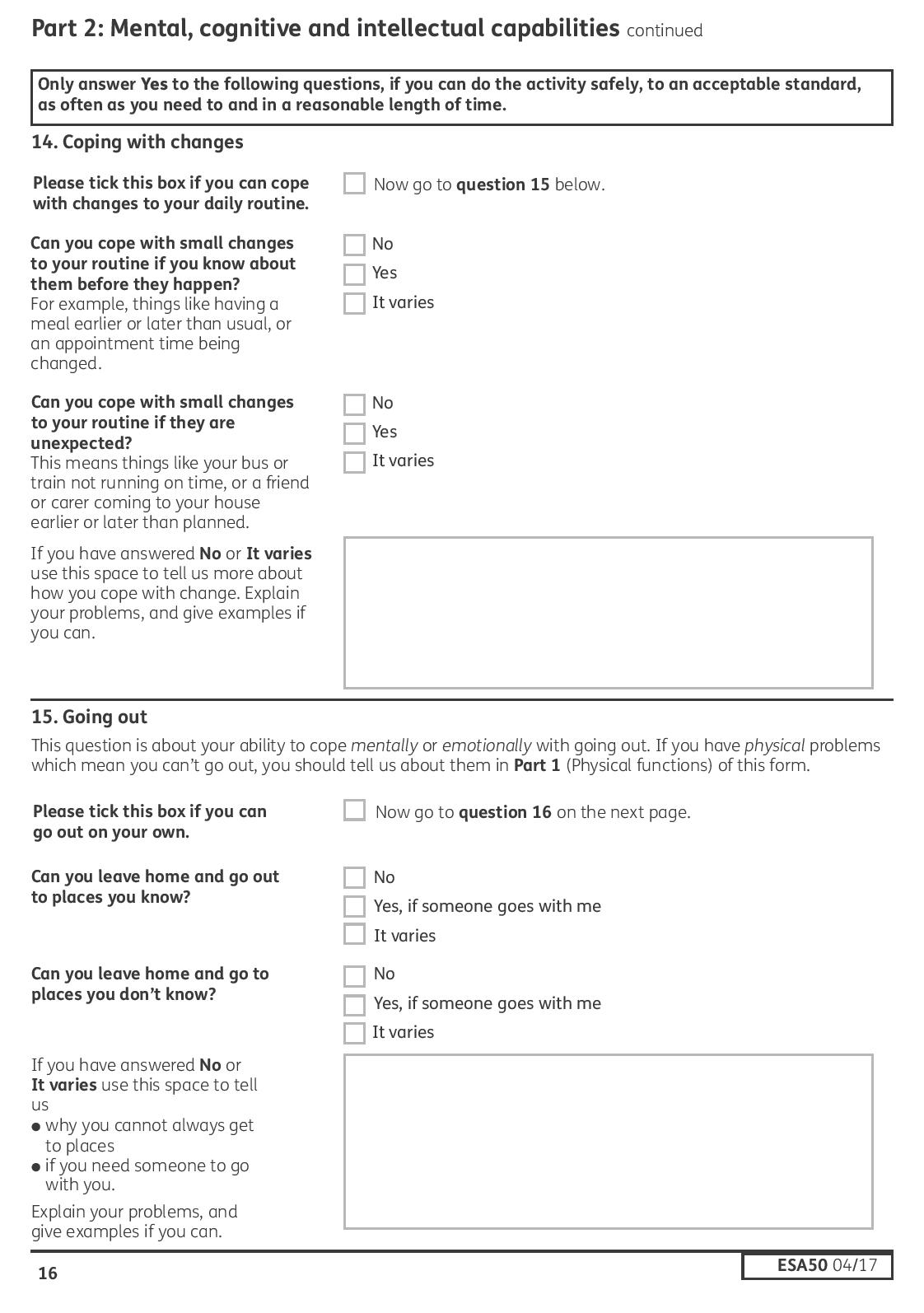Q15 - going out
This advice applies to Scotland. See advice for See advice for England, See advice for Northern Ireland, See advice for Wales
This question is on page 16 of the form - see what it looks like

How to answer the question
This question is about whether you can cope mentally or emotionally with going out - for example if you have anxiety, panic attacks or agoraphobia.
You don't need to write about how you'd physically get to places -you just need to write about how it makes you feel when you have to go out.
Explain how you feel getting to places. When thinking about this, ignore any help you may get from maps or mobile phone apps.
If physical problems stop you going out, you should explain this in question 1.
"Can you leave home and go out to places you know?"
No
Yes, if someone goes with me
It varies
This question is about familiar places. Think about what would happen if you had to go to your local Post Office, bank or supermarket on your own.
Don't feel embarrassed if you have to tick "no", for example if:
most of the time you can't go to familiar places even if another person comes with you
If you can get to a familiar place, but only if someone comes with you, you should tick "yes" and explain why, for example if:
you would feel anxious or distressed if you tried to go out without another person
"Can you leave home and go out to places you don't know?"
No
Yes, if someone goes with me
It varies
This is about places you don't know. Think about what would happen if a friend or family member moved and you were going to their new house.
Don't feel embarrassed if you have to tick "no", for example if:
you find it difficult to go to an appointment somewhere new, even if another person comes with you
you can't go out and buy food on your own in a shop you don't normally go to - you'd have only use shops you know or wait until someone can do it for you
If you can get to an unfamiliar place, but only if someone comes with you - tick "yes" and explain why you need the other person in the box.
What to write in the box
It's important you tell the DWP more by explaining your situation in the box.
You should explain things like:
if a mental health condition causes you problems going out - what the condition is and what medication you take for it
what would happen if you tried to go to a familiar or unfamiliar place on your own
any difficulties you get into when you go out - for example panic attacks, getting lost or road accidents
the difference it makes if you have someone with you
if you have good and bad days, and what the differences are
Karl says: "I have agoraphobia and can only deal with going to places I know, like my local doctor's surgery and my neighbour's house. I can't go to new places, even if my carer comes with me. I'd get severe anxiety if I had to go on public transport or to a different hospital to the one I normally go to."
How the DWP assess this question
The DWP look at a list of statements called 'descriptors'. They'll give you a number of points depending on which descriptor applies to you.
The DWP add together all the points you get from the whole form. This means you can qualify for ESA even if you don't get all the points for this question.
Descriptors for question 15
| Descriptors | Points |
|---|---|
|
Descriptors
15 (a) Cannot get to any place outside the claimant's house with which the claimant is familiar. |
Points
15 |
|
Descriptors
(b) Is unable to get to a specified place with which the claimant is familiar, without being accompanied by another person. |
Points
9 |
|
Descriptors
(c) Is unable to get to a specified place with which the claimant is unfamiliar without being accompanied by another person. |
Points
6 |
|
Descriptors
(d) None of the above apply. |
Points
0 |